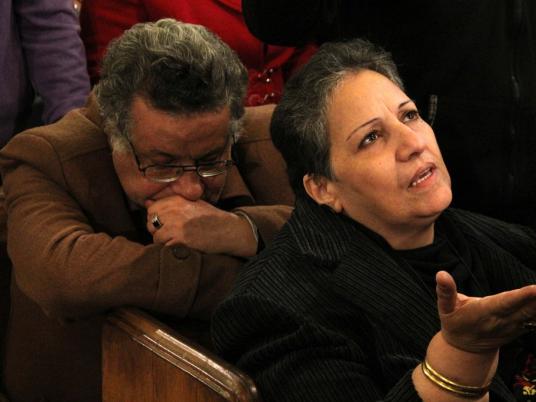
Quota Coordination is a campaign launched by 30 independent Coptic Christian activists last week, demanding 15-percent representation for Copts in parliament and public offices. The campaign opposes the church for rejecting the quota.
Egypt Independent met with Chancellor Amis Ramzy, a leading figure of the movement and president of the Shubra al-Kheima Criminal Court. He says Copts have been marginalized for decades. He calls for a concerted campaign of positive discrimination in all state bodies for Copts, a system applied in 61 countries around the world.
However, he is not for voting against the Constitution because the political situation cannot bear it. He believes that Copts are nowadays living their golden era, and urges them to vote for the Constitution.
Q. What do Coptic Christians want from the 2013 Constitution?
A. I must say that the Committee of 50 is following the same course of the Muslim Brotherhood. Its members look like they want to please everyone without paying attention to Egypt’s real problems. There are three marginalized social categories that the Constitution should pay attention to, namely: Coptic Christians, young people and women.
Q. What should the committee do about them?
A. Copts should be well represented in parliament, local councils and all government institutions.
Q. What do you think is an appropriate percentage of representation?
A. 10 to 15 percent.
Q. How can this be achieved?
A. By determining a certain number or constituencies so as to ensure positive representation.
Q. A quota?
A. The quota is one mechanism but is not enough. Some are displeased with it. Call it a quota, call it something else. What we need is minimum positive representation. Nasser determined a representation of 50 percent for farmers and workers in 1952 because they were marginalized at that time.
Q. Some want the quota for personal interests. What do you make of that?
A. I am a judge and I want nothing more. But I call for a positive discrimination of Copts because I live among them and feel what they suffer.
Q. A quota for Copts may encourage others to request the same. The Nubians, for example. What do you think of that?
A. Positive discrimination is good for everyone. Nubia and Sinai need no special quotas. They need more constituencies.
Q. Doesn’t the Pope himself reject the quota?
A. Yes, but he accepts positive discrimination. It is better than a fixed quota that does not change.
Q. Isn’t this a sectarian requirement?
A. Not at all. Positive discrimination is implemented in 61 countries around the world. The United States had it for black people at one time. France had it for women.
Q. But the law does not ban Copts from public office. What would we need positive discrimination for?
A. This is not happening on the ground. The state must show its real position vis-avis the Copts. Does it consider them traitors or second-grade citizens? Perhaps it should stop saying that Muslims and Christians are one people who made one revolution. Were the Copts a mere tool?
Q. How do you regard Egypt's transitional period?
A. The current regime is no different than that of Mohamed Morsy. We hope for a better future.
Q. How did the Copts fare under the Muslim Brotherhood?
A. They were dark times. We had no hope. But God saved Egypt from them.
Q. The church issued a statement after you requested the quota saying the Pope speaks for the church. Does this mean the church rejects the quota?
A. I was shocked by that statement on Thursday. A day earlier, I was meeting with the Pope. He did not say that he wants no one to speak on behalf of the church.
Q. What happened in that meeting?
A. The Pope rejected the quota but accepted the idea of positive discrimination.
Q. Will the church withdraw from the Committee of 50?
A. I am against that now.
Q. Why?
A. It would create disorder. Even Article 219 we will reject but without withdrawing. We do not want to divide the country, even if it is at our expense.
Q. But many activists have called for withdrawal if there is no quota. What do you say to that?
A. I am for positive discrimination. The committee should maintain the unity of society in the Constitution. I will work hard for that even if it means we forfeit our demands for a while.
Q. Would the Copts vote for the Constitution or against it?
A. They will vote for it. I hope it solves their problems.
Q. In your opinion, why does the Nour Party insist on Article 219 that interprets the Sharia?
A. They want to apply the Sharia although it is not they who are ruling the country.
Q. What is the difference between the Nour and the Freedom and Justice parties?
A. They are two sides of the same coin. They fail to see that Egypt is on the road to a civil state. The Nour Party wants power.
Q. What do you think is the most appropriate electoral system?
A. In the case of positive discrimination of Copts, young people and women, with 150 seats for them, the individual system is the best.
Q. What if this does not happen?
A. Then a mixed individual and list-base system.
Q. And if that does not happen, would the church boycott the elections or vote against the Constitution?
A. No. Unity comes before any quota. But young Coptic movements may boycott.
Q. What do you think of Pope Tawadros II?
A. He is a great person and a wise man. He took responsibility of the church at a difficult time. But he listens to everybody.
Q. When was the golden age for the Copts?
A. During the monarchy and nowadays.
Q. Do the Copts want Abdel Fattah al-Sisi as president?
A. Perhaps not as a military man, but as a man loyal to the people.
Edited translation from Al-Masry Al-Youm
